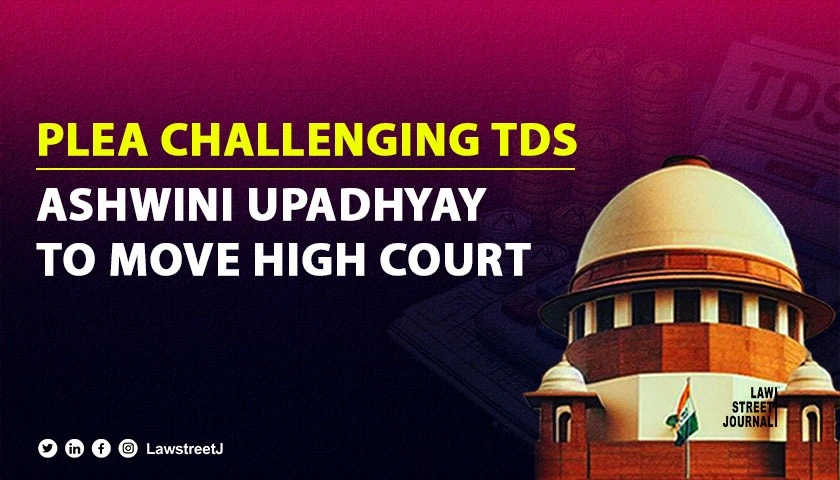NEW DELHI: The Supreme Court on Friday declined to entertain a PIL by eminent lawyer Ashwini Kumar Upadhyay seeking a declaration that the Tax Deducted at Source (TDS) system is manifestly arbitrary, irrational and against Articles 14, 19, 21 of the Constitution, hence void and inoperative.
A bench of Chief Justice of India Sanjiv Khanna and Justice Sanjay Kumar said, "We will not entertain this. We don't want to express anything on merit. The petitioner can move the High Court."
SC Refuses to Hear PIL Against TDS, Suggests High Court as Recourse
The court also pointed out there have been judgment which upheld the validity of this provision.
After this, Upadhyay said he would approach the Delhi High Court on the issue.
Upadhyay claimed the regulatory and procedural framework surrounding TDS is excessively technical, often requiring specialised legal and financial expertise, which most assessees lack. The result is an unjust shifting of sovereign responsibilities from the government to private citizens without adequate compensation, resources, or legal safeguards.
Ashwini Upadhyay Challenges TDS System: Claims Violation of Fundamental Rights
Alternatively, he sought a direction to the NITI Ayog to consider the grounds and contentions raised in this petition and suggest the necessary changes in Tax Deducted at Source (TDS) system; or direct the Law Commission of India to examine the legality of the Tax Deducted at Source (TDS) system and prepare a report within three months.
The PIL contended Illiterate or economically weaker assessees, who lack the capacity to navigate technical framework, suffer undue hardship and harassment, undermining the constitutional guarantee of equality before the law under Article 14.
"This amounts to an indirect tax burden imposed on TDS assessees, which lacks explicit legislative sanction, making it unconstitutional and against public interest," it stated.
The TDS regime adversely impacts small earners and those below the taxable threshold, as tax is often deducted at source despite their incomes being non-taxable. This creates a system where small taxpayers are forced to file refund claims for excess TDS. It is economically unviable for many due to the cost of professional assistance and repeated visits to tax offices, which can lead to harassment and loss of time.
"Many taxpayers, especially in rural and economically weaker sections, forgo their rightful refunds, resulting in unwarranted enrichment of the Government. This practice violates the constitutional principles of fairness, equity, and public interest, as it disproportionately exploits the most vulnerable segments of society," it said.
The petitioner stated the PIL is for the benefit of TDS assessees who have become a cog in the financial machinery of the country.
"No heed is paid to the illogical work system where private entities are bound to stricter regulations than the government officials. The transfer of sovereign duty on private entities without compensating them for the same is arbitrary and against the fundamental principles of the constitution," the PIL said.
The petitioner stated the Government’s objectives of timely and regular tax collection can be achieved more effectively and equitably by replacing the TDS regime with a system of monthly advance tax payments.
"Under this alternative: Taxpayers earning taxable income beyond the exempt limit can be required to remit monthly installments of advance tax directly to the Government. This eliminates the need for intermediaries (i.e., TDS assessees) and reduces procedural complexities for individuals making payments subject to TDS. The Income Tax Department’s technological infrastructure, including the PAN and e-filing systems, is sufficiently advanced to track advance tax payments and ensure compliance," it said.
The PIL claimed the proposed system offers more advantages over the TDS regime as it reduces hardships for TDS Assessees. By shifting the tax compliance burden to those earning taxable income, the alternative system alleviates the hardships faced by TDS assessees, particularly those who are illiterate/lack expertise.
This new system enhances compliance by taxpayers as those with taxable income would be directly responsible for calculating and remitting taxes, ensuring greater accountability and transparency. It would encourage fairness in tax administration with the principles of equity and proportionality by holding actual income earners, rather than intermediaries, accountable for their tax liabilities.

















